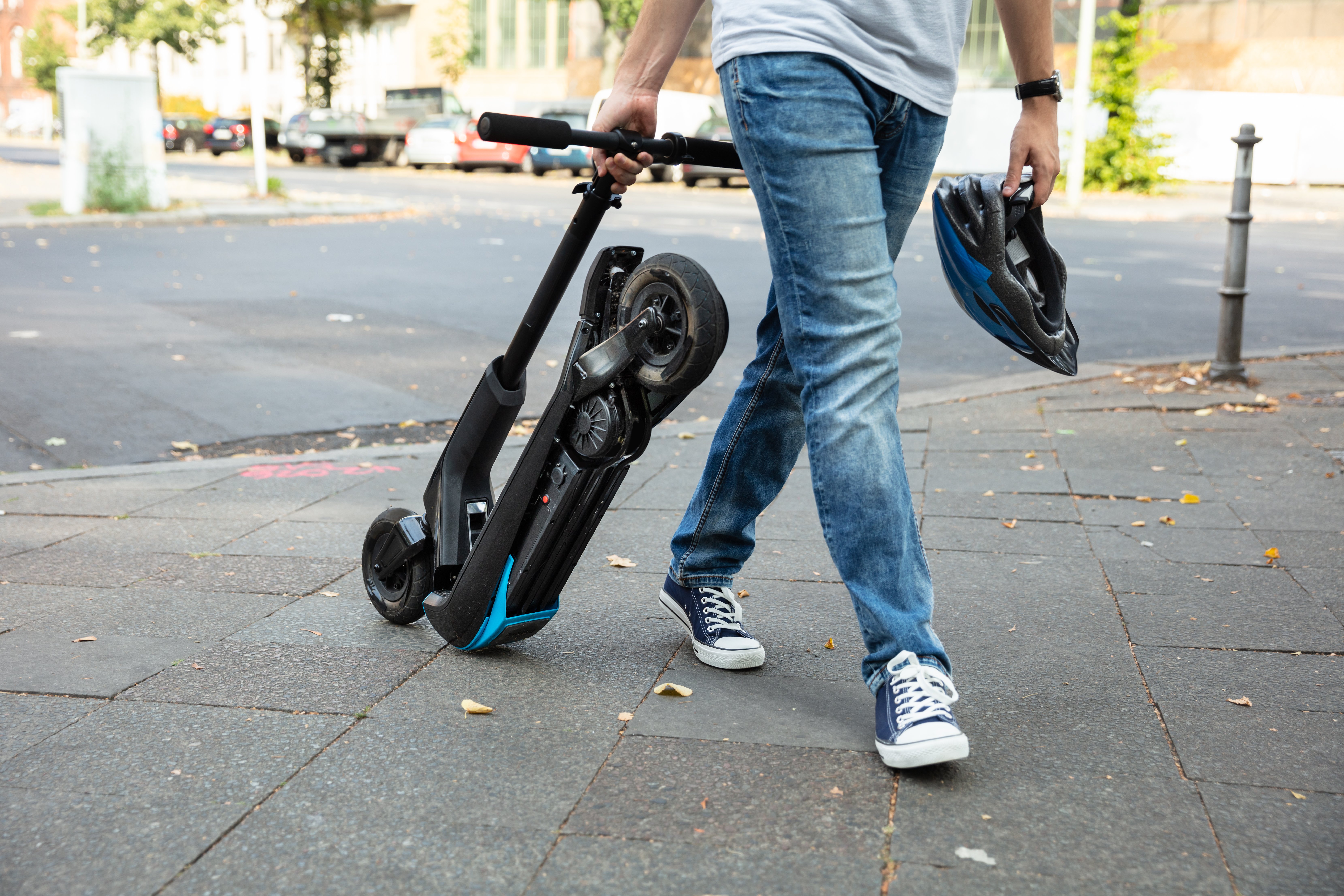An electric scooter typically weighs around 25 to 35 pounds. Electric scooters are lightweight vehicles that offer convenient and eco-friendly transportation options.
With their compact design and portability, they are becoming increasingly popular for urban commuting and short-distance travel. In addition to being lightweight, electric scooters are also known for their ease of use and smooth operation. Whether you’re looking for a foldable model for easy storage or a powerful one for longer rides, electric scooters come in a variety of sizes and weight categories to suit individual preferences and needs.
Their lightweight nature makes them an ideal choice for those who want to easily maneuver through crowded streets or carry them when needed.

Contents
- 1 Importance Of Electric Scooter Weight
- 2 Ideal Weight Range For Electric Scooters
- 3 Impact On Speed And Acceleration
- 4 Influence On Battery Life And Range
- 5 Lightweight Electric Scooters
- 6 Mid-Weight Electric Scooters
- 7 Heavyweight Electric Scooters
- 8 Identifying Your Riding Needs And Preferences
- 9 Factors To Consider When Deciding On Weight Range
- 10 Frequently Asked Questions
- 10.1 How Much Does An Electric Scooter Weigh?
- 10.2 What Is The Average Weight Capacity Of An Electric Scooter?
- 10.3 Are All Electric Scooters Foldable For Easy Transportation?
- 10.4 How Does The Weight Of An Electric Scooter Affect Its Performance?
- 10.5 Can The Weight Of The Rider Affect The Range Of An Electric Scooter?
- 11 Final Thoughts
Importance Of Electric Scooter Weight
The weight of an electric scooter plays a crucial role in its overall performance. It impacts its stability and maneuverability, ensuring a safe and comfortable riding experience. A lighter scooter allows for easier handling and swift turns, making it ideal for crowded urban environments.
Additionally, a lighter scooter is more portable and convenient to transport, especially when you need to carry it upstairs or store it in tight spaces. Whether it’s for commuting or leisure purposes, the weight of an electric scooter is a vital consideration that directly affects its usability.
So, next time you’re looking to purchase an electric scooter, don’t forget to take into account its weight to enhance your riding experience.
Ideal Weight Range For Electric Scooters
Electric scooters come in a range of weights, depending on various factors. Demographics and preferences play a role in determining the ideal weight for each user. Lightweight scooters offer several benefits, such as ease of maneuverability and portability. They are particularly suitable for commuters and individuals who may need to carry their scooters for short distances.
However, finding the perfect balance between weight and features is important. The weight of an electric scooter can affect its performance, speed, and battery life. Therefore, it is crucial to consider the weight capacity of the scooter, the terrain it will be used on, and the intended purpose before making a decision.
By carefully assessing these factors, users can choose an electric scooter that suits their needs and preferences.
Impact On Speed And Acceleration
Electric scooter weight directly impacts its speed and acceleration. The relation between weight and speed is crucial. Heavier scooters tend to have slower acceleration and lower maximum speeds. This is because the weight affects the scooter’s power-to-weight ratio. The heavier the scooter, the more power it needs to accelerate, resulting in slower speeds.
On the other hand, lighter electric scooters have better acceleration and can reach higher speeds with less effort. It’s important to consider the weight of an electric scooter when making a purchase, especially if speed and acceleration are desired. So, keep in mind that a lighter electric scooter will offer a faster and more efficient ride.
Influence On Battery Life And Range
Electric scooter weight plays a crucial role in determining the battery life and range. The consumption of battery power is directly affected by the weight of the scooter. Heavier scooters tend to consume more battery power, leading to a shorter range.
On the other hand, lighter scooters require less energy to move, allowing for a longer range. Factors such as the weight of the rider, terrain, and speed also impact the scooter’s range. To maximize the battery life and range, it is important to consider the weight of the scooter when making a purchase.
By choosing a lighter electric scooter, riders can enjoy longer rides and reduce the need for frequent recharging.
Lightweight Electric Scooters
Lightweight electric scooters are a popular choice due to their easy maneuverability and portability. Weights ranging from 20-30 pounds make them ideal for commuting and traveling short distances. These scooters are designed to be compact and lightweight, making them effortless to carry and store.
The advantages of lightweight electric scooters include their ability to navigate through crowded areas, quick acceleration, and ease of handling. They are also energy-efficient and eco-friendly, making them a sustainable transportation option. However, there are some disadvantages to consider. Lightweight scooters may have a lower weight capacity and less stability compared to heavier models.
Additionally, their smaller frame may not accommodate larger riders comfortably. Despite these limitations, lightweight electric scooters are an excellent choice for individuals seeking convenience and ease of use for their daily commutes or recreational purposes.
Mid-Weight Electric Scooters
Mid-weight electric scooters typically weigh between 30 and 40 pounds, making them fairly easy to handle. The reduced weight enhances these scooters’ overall performance and their usability for everyday commuting or recreational purposes. With lighter electric scooters, riders can maneuver more effortlessly through traffic or crowded spaces.
Additionally, the mid-weight range strikes a balance between portability and stability, ensuring a comfortable ride without compromising on durability. These scooters are designed to be agile and versatile, providing users with an optimal experience. Whether you need a scooter for short distance travel or longer rides, the mid-weight category offers a suitable solution.
By opting for an electric scooter within this weight range, you can enjoy the convenience and eco-friendly nature of this mode of transportation without sacrificing performance or maneuverability.
Heavyweight Electric Scooters
Electric scooters come in a range of weights, with some heavy models weighing over 40 pounds. Despite their hefty size, these heavyweight electric scooters offer enhanced stability and endurance benefits. Their weight helps with balance and allows for smoother rides.
The added bulk also means that these scooters can handle rugged terrains and inclines with ease. With their powerful motors and sturdy construction, they can carry heavier loads without losing speed or performance. Whether you’re commuting to work or enjoying a leisurely ride around town, these heavy electric scooters are designed to provide a reliable and robust transportation option.
So, if you’re looking for a solid and durable electric scooter, don’t shy away from the heavyweight models.
Identifying Your Riding Needs And Preferences
Electric scooter weight varies depending on factors like intended purpose and riding conditions. For instance, if you plan to use it for commuting, you might prefer a lighter scooter that is easier to carry. On the other hand, if you want to ride off-road or on uneven terrain, a heavier scooter with more stability may be ideal.
It’s important to consider your needs and preferences before making a decision. Keep in mind that electric scooters typically range from 20 to 80 pounds in weight, so choose one that suits your intended use and is manageable for you.
By carefully considering the terrain and riding conditions you anticipate, you can find the electric scooter that’s the right fit for you.
Factors To Consider When Deciding On Weight Range
Factors to consider when deciding on the weight range of an electric scooter include the user’s strength and physical capabilities. User strength determines how easily the scooter can be maneuvered and controlled. Additionally, physical capabilities play a role in how comfortable and safe the user feels while riding.
Portability requirements are also important to consider; a lighter scooter can be easier to transport when needed. Storage options should be taken into account as well, as heavier scooters may require more space. Overall, choosing the right weight range for an electric scooter depends on the individual’s specific needs and preferences, ensuring a pleasant and convenient riding experience.
Frequently Asked Questions
How Much Does An Electric Scooter Weigh?
An electric scooter typically weighs between 20 to 40 pounds, depending on the model and specifications.
What Is The Average Weight Capacity Of An Electric Scooter?
The average weight capacity of an electric scooter is around 220 to 300 pounds, but this can vary between models.
Are All Electric Scooters Foldable For Easy Transportation?
No, not all electric scooters are foldable. However, many models are designed to be foldable for convenience when commuting or storing the scooter.
How Does The Weight Of An Electric Scooter Affect Its Performance?
The weight of an electric scooter can affect its performance in terms of acceleration, battery life, and handling. Heavier scooters may have a slightly slower acceleration and reduced battery life compared to lighter ones.
Can The Weight Of The Rider Affect The Range Of An Electric Scooter?
Yes, the weight of the rider can affect the range of an electric scooter. The heavier the rider, the shorter the range the scooter can achieve on a single charge.
Final Thoughts
The weight of an electric scooter is an important factor to consider when making a purchase. Lighter models are generally more portable and easier to maneuver, making them ideal for urban commuting or short trips. Heavier scooters, on the other hand, tend to offer more stability and are suitable for longer distances or off-road adventures.
It’s crucial to understand your specific needs and usage patterns before deciding on the ideal weight for an electric scooter. Remember to consider factors such as battery capacity, motor power, and intended terrain, as these can affect the overall performance and efficiency of the scooter.
By finding the right balance between weight and functionality, you can enjoy a smooth and enjoyable ride with your electric scooter. Make an informed decision and embrace the convenience and eco-friendliness that electric scooters have to offer.


